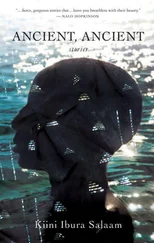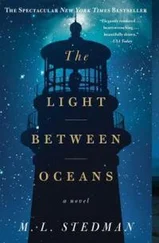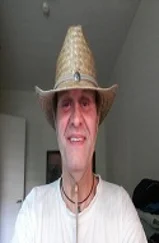Rebecca Shepherd remembered the gauze of scum on the surface of a lake and called her father on his birthday and brought the children to see him and they watched as Leah and Jacob ran around the yard of the farmhouse.
Her sisters, gone to Florida as a teen in trouble, or married to a preacher, or drowsing by a pool.
In college, Leah went on a date with a man who claimed to be a jockey. They sat in the cab of his pickup truck after a drive-in movie and he talked about his ex-wife, spittle flying off of his lips onto the steering wheel. He talked about how Mexicans were riding all the good horses now. He fell silent for long stretches. Afterward, he pawed and panted and she held him at bay with one long arm. When she would not relent, he kicked her out of the cab and drove off, leaving her alone on a rural road. Deep green trees in the deep night are darker than anything else, especially as high-summer air rambles through.
As she walked, she tried not to think about the encyclopedia entry on Legal Issues Related to the Disposal of Dead Bodies that she’d read:
— failure to bury or dispose of bodies; burial without a permit; wrongful disposal of the body; delivery of dead bodies to the loved ones; to kin; for dissection; for ridicule; for viewing; for rueful viewing; for nothing; civil liability for mutilations, generally; a record of disinterment—
So many things can go wrong, even after you are done. When she returned to campus, her roommate was still awake, waiting in the semi-dark. “Sooooooo?”

Her stomach covered in ticks. They’d followed tree trunks painted red and wound up hills in cool shade. Shadows slanted down and the path rose. They heard people walking in the water but couldn’t see them, heard dogs fluttering above. They’d brought books to read, but they were left open, pages to the ground, unread, as the young couple pressed into one another, pulled up shirts and unbuttoned and unzipped and the scratches of grass and rocks on skin and the warm sigh of summer on their faces and thighs and stomachs. The saw and chip of summer. She asked him to pull them off and his face twisted in disgust. The swell of cicadas, some lost Blue Ridge Brood. Leah Shepherd sighed and pulled them off herself with a match. She drug her shirt back down.
The engagement would not last. He told his family that she was cold and that the doctorate meant more to her than he did, that she didn’t support his career, that she was hell-bent on moving back to Kentucky — Dear God — and in the end he hadn’t even been that attracted to her physically but was yet another example of him feeling sorry for a girl, being there for her as a friend and supporting her, and mistaking that feeling of duty for love or something. In retrospect, he felt more embarrassed than anything else. He told his family that he wasn’t angry with her for the two years they were together, the time he spent on her, the time he could have given to his research. Yes, if he’d spent that time on his work, he probably could have found something better than these adjunct positions, he’d had promise, all his teachers had told him about his promise, but he did not blame her for the years she took. Rather, he felt like the experience might have left him with material for a novel.
Plus, don’t you know, she didn’t even finish her dissertation, leaving with a masters and not much more. Leah didn’t explain the failure of the engagement to her parents because they didn’t ask.
Derrick Green would sit next to Leah in every class and ask her if she wanted to get coffee and she agreed. He was light-hearted and kind and when she didn’t care to talk, he respected her. When he told the joke that had ended it all, Leah hadn’t exploded in tears or rage or fists, which she would have been entitled to, but she receded, just far enough that he understood that he could no longer reach her. If only he’d known, he would never have told such a joke, at least not in front of her, but he never knew because she never explained, never told him anything about her childhood other than it wasn’t worth talking about. In that, he felt that she bore much of the blame.
At a party, standing with some of the other young men in the program, he told the joke and they laughed, all but her. The same laugh he always got, a pause, a moment of uncertainty, and then the burst of rough laughter, involuntary, and then a second cascade of laughter, laughter of embarrassment at having laughed at such a joke. She walked off and he could immediately tell that he should not have told it, beyond the usual disgusted smirk he would occasionally get, usually from women.
And that car , he thought, that car that took up more money to maintain than it was worth. What a wasteful woman, throwing money at that blue monstrosity just because she thinks it makes her look cool . Derrick would plead with her to trade it in and get something more reliable — he couldn’t come get her every other week when her car decided to give out while she was out on a Sunday drive. They faded and fell apart and the absence of any real distress that he could understand angered him. He felt like he deserved something more direct from her for the crumbling relationship, but Leah would only say, “There’s nothing wrong. I promise.” Or “There is nothing wrong except you keep asking me what is wrong.” Or “What do you want from me?” And he began to pick fights just to get a response, but nothing worked. Leah was a rowboat in a lake cut loose from the dock, slowly drifting out into the haze of morning, fading, blank and white and then one day gone.
He told his parents and they asked him to pray, and the family bowed their heads and prayed that the woman who’d so wounded their son would open her heart to a man someday and learn the peace that can be found in being led. At dinner, he told his father, “Oh, you have to hear this joke.”
“I want to show you something strange.”
The variety of shades of gray outside her window shifted their hue and quality and she opened another file to begin working. As she jotted notes in the margin of an application for aid, her mind wandered. How much of what I’ve known in my life, have I forgotten?
She remembered the nights when she would hear the door downstairs open, the faint click of the doorknob turning, the squeal of hinges, something coming, steps in the hall, steps on the stairs, and then a pause, just outside of the room she shared with her brother, and remembering this, it all felt to her as though it could never have been any other way. God, whisper everything away, she prayed, away from us, and perhaps God heard because eventually the steps moved on down the hallway, slow steps fading into the settled silence of the dark house and the children would, despite the red feeling in their throats, do the thing they never thought they would do again — fall asleep. She remembered the nights telling Jacob how, if he didn’t stop talking to her and let her sleep, that a creature would come for him and she remembered the glee she felt when she heard him cry and the shame she felt when she heard him cry, and the feeling now, in her bed in her apartment, thinking back to the boy in his bed that she terrified and she felt herself cave in. But she was just a child too, she told herself, and then remembered the sound, in the nights after he was gone, the sound of the door opening in the well of night, the sound of someone, or something moving in the house, and the sudden fear that her stories had come true. She never once considered that it might be Jacob coming home and only now, kicking her blanket off of her legs in the warm bedroom, despite the open window, did she realize that she never once considered it. He was always final.
Читать дальше













